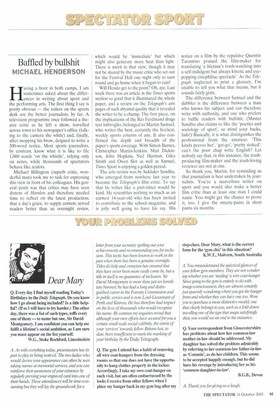Baffled by bullshit
MICHAEL HENDERSON
Having a boot in both camps, I am sometimes asked about the differences in writing about sport and the performing arts. The first thing I say is pretty obvious — the toilers on the sports desk are the better journalists, by far. A television programme once followed a theatre critic as he left a show, travelled across town to his newspaper's office (talking to the camera the while) and, finally, after mopping his brow, deigned to write a 500-word notice. Most sports journalists, by contrast, know what it is like to file 1,000 words 'on the whistle', relying only on notes, while thousands of spectators behave like zealots.
Michael Billington (superb critic, wonderful man) took me to task for expressing this view in front of his colleagues. His general point was that critics may have seen dozens of Hamlets and therefore needed time to reflect on the latest production; that a day's grace, to supply context, served readers better than an overnight review. which would be 'immediate' but which might also generate more heat than light. There is merit in that view, though it may not be shared by the music critic who set out for the Festival Hall one night only to turn round and go home when it began to rain!
Will Hendo get to the point? Oh, aye. Last week there was an article in the Times sports section so good that it illuminated the whole paper, and a review on the Telegraph's arts pages of such abysmal quality that it revealed the writer to be a chump. The first piece, on the implications of the Rio Ferdinand drugs test imbroglio, belonged to Martin Samuel, who writes the best, certainly the liveliest, weekly sports column of any. It also confirmed the depth and breadth of the paper's sports coverage. With Simon Barnes, Christopher Martin-Jenkins, Matt Dickinson, John Hopkins, Neil Harman, Giles Smith and Owen Slot as well as Samuel, Times Sport is enjoying a golden period.
The arts review was by Sukhdev Sandhu, who emerged from nowhere last year to become the Telegraph's film critic. To say that he writes like a part-timer would be kind. He resembles nothing so much as an earnest 14-year-old who has been invited to contribute to the school magazine, and is jolly well going to have his say. His
notice on a film by the repulsive Quentin Tarantino praised the film-maker for translating 'a lifetime's trash-watching into a self-indulgent but always kinetic and eyepopping cinephiliac spectacle'. As the Telegraph neglected to print a glossary, I'm unable to tell you what that means, but it sounds fairly grim.
The difference between Samuel and the dabbler is the difference between a man who knows his subject and can therefore write with authority, and one who prefers to baffle readers with bullshit. (Master Sandhu also claims to like the 'poetics and sociology of sport', so mind your backs, lads!) Basically, it is what distinguishes the professional from the amateur. 'This kinda peeves her', 'get-go', 'pretty stoked': can't the poor chap write English? Let nobody say that, in this instance, the trashproducing film-maker and the trash-loving reviewer are not at one.
So thank you, Martin, for reminding us that journalism is best undertaken by journalists. You're a marvellous writer on sport and you would also make a better film critic than at least one man I could name. You might get the chance to prove it, too. I give the smarty-pants in short pants six months.


































































































 Previous page
Previous page